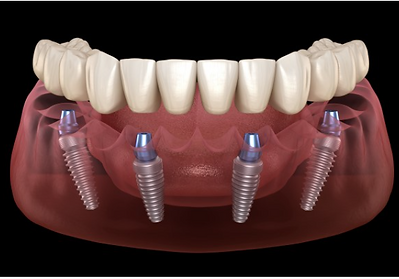Replace Your Missing Teeth with Single or Full Arch Implants
Your Health is in Good Hands
Of all the ways modern dentistry has to replace missing teeth, dental implants are by far the best. There is no tooth-replacement option that will give you a longer-lasting result. Implants also help preserve tooth-supporting bone that naturally deteriorates when a tooth is lost. Loss of bone is one of the major hidden consequences of losing teeth.
A dental implant most often takes the form of a small, screw-shaped titanium post that replaces the root-part of a missing tooth. The surgical procedure used to place an implant is actually quite minor and routine, requiring only local anesthesia in most cases. After a healing period, the implant is topped with a lifelike crown custom-made to match your existing natural teeth. Implants have a documented success rate of over 95%, which is significantly higher than any other tooth-replacement option.



Advantages of Treatment with Implants
1
Long Term Solution and Easy Maintenance
Dental implants are long-term tooth replacements because they will never decay. The dental crown material is stain-resistant, so your dental implants will stay dazzling for decades.
Implants are easy to maintain. You brush and floss, just like your natural teeth. Keeping your smile beautiful and healthy is a snap with dental implants.
2
Natural Look and Stability
Dental implants look just like your natural teeth. The crown is made of light-reflective materials and looks the same as tooth enamel. Dental implants are virtually indistinguishable from your natural teeth.
Dental implants offer complete stability because they are fixed in place and surrounded by bone. They will never move and become a permanent addition to your smile.
3
Versatility and Success Rate
Dental implants offer the versatility of replacing one missing tooth with a single implant, several missing teeth with an implant-supported bridge, or an entire arch of teeth with an implant-supported denture.
According to the American Academy of Oral and Maxillofacial Surgeons, dental implants also offer a success rate of over 95%, making them the most successful surgical implant.
TYPES OF DENTAL IMPLANTS
Single Tooth Implants

When you have one tooth missing, a single implant is inserted into the bone to replace the root part of that tooth; a crown then goes on top to simulate an actual tooth. This treatment choice has the highest success rate, making it the best long-term investment for replacing a single missing tooth. Even if the initial cost is slightly higher than other options, it is the most cost-effective solution over time. An implant will never decay or need root canal treatment, and feels just like the tooth that was there.
Implant Supported Bridge

An implant-supported bridge is a replacement for several teeth that is secured permanently to dental implants.
Implant Supported Denture

An implant-supported denture replaces every tooth of the jaw with a removable denture attached to the implants.
Fixed Full Arch Implants

Fixed full-arch implants replace every tooth on the jaw with a dental bridge that attaches to four dental implants. The all-on-4 treatment is a complete and functional set of artificial teeth.
Before and After




Price Transparency Guarantee
Single Tooth Implant
As low as $104.62/month or $3,495
(Full Price: $5,791)
-
Evaluation
-
3D CBCT Scan
-
Implant Placement
-
Abutment
-
Implant Crown
Full Arch Implants (All-on-X)
As low as $264.15/month or $19,495/arch
(Full Price: $24,995)
-
Evaluation
-
3D CBCT Scan
-
Teeth Extraction
-
Oral Sedation
-
Implant Placement
-
Abutment
-
Temporary Teeth
-
Permanent Teeth
Implant Care and Maintenance
There are only two ways an implant can lose attachment to the bone and fail once it has successfully fused: poor oral hygiene or excessive biting forces. Poor oral hygiene and/or a lack of regular cleanings can lead to a destructive bacterial infection called peri-implantitis. Flossing and brushing your teeth on a daily basis, along with regular professional cleanings, can prevent this. Excessive biting forces can come from either a habit of clenching or grinding your teeth, or an insufficient number of implants to handle the forces generated by your bite. You should receive the correct number of implants so this does not happen. And if you have a habit of grinding or clenching your teeth, a nightguard will be recommended to protect your implants. After all, implants are a long-term investment in your smile, your health and your well-being, so it's best to protect your investment.


